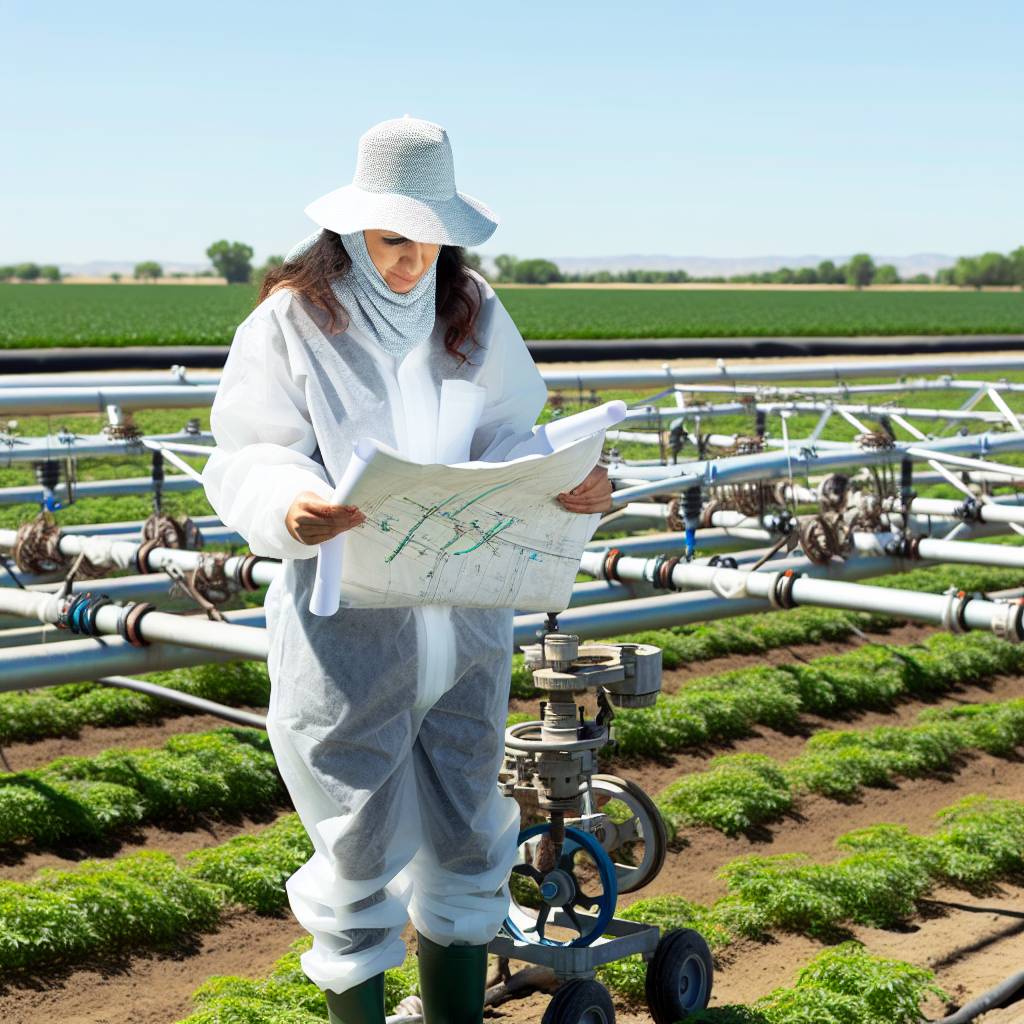Obtaining certifications is crucial for irrigation specialists to showcase their expertise and credibility in the industry.
With the increasing demand for qualified professionals in the field, certifications help individuals stand out and demonstrate their skills.
Certified Irrigation Designer (CID)
This certification, offered by the Irrigation Association, validates a specialist’s ability to design efficient irrigation systems.
It covers topics like hydraulics, water management, and soil-plant relationships.
CID holders are recognized for their proficiency in creating sustainable irrigation designs that conserve water.
Certified Irrigation Contractor (CIC)
CIC certification focuses on installation and maintenance practices.
It ensures that specialists adhere to industry standards and best practices when installing irrigation systems.
This certification demonstrates the individual’s knowledge of proper installation techniques, equipment selection, and troubleshooting methods.
Certified Landscape Irrigation Auditor (CLIA)
CLIA certification is designed for professionals who assess the efficiency of irrigation systems.
It equips specialists with the skills to audit irrigation systems, identify inefficiencies, and recommend solutions to improve water conservation.
CLIA holders play a vital role in promoting responsible water usage in landscaping projects.
Certifications for irrigation specialists not only enhance their professional credibility but also contribute to their continuous learning and development.
By investing in these certifications, specialists can expand their knowledge, improve their skills, and advance their careers in the competitive field of irrigation.
Importance of Certification:
Certifications play a crucial role in validating an irrigation specialist’s knowledge and skills in the field.
It serves as a significant indicator of their expertise and competence, which can be beneficial in various aspects of their career.
Validates Specialist’s Knowledge and Skills:
- Certifications demonstrate that an irrigation specialist has undergone the necessary training and has acquired the essential skills required for the job.
- It ensures that specialists are up-to-date with the latest industry standards, technologies, and best practices in irrigation.
- Certifications serve as a benchmark for evaluating the competency of specialists and their ability to deliver high-quality services.
Helps Specialists Stand Out in a Competitive Job Market:
- In today’s competitive job market, having certifications can give specialists a competitive edge over their non-certified counterparts.
- Certifications demonstrate a specialist’s commitment to professional development and excellence in their field, making them more attractive to potential employers.
- Certified irrigation specialists are often preferred by clients and employers as they are perceived to have higher levels of expertise and credibility.
Certifications not only validate a specialist’s skills and knowledge but also help them to distinguish themselves in a crowded and competitive job market.
It is essential for irrigation specialists to pursue relevant certifications to enhance their career prospects and credibility in the industry.
Irrigation Association Certifications
The Irrigation Association offers various certifications for irrigation specialists.
These certifications provide professionals with the necessary skills and knowledge to excel in their field.
Here is an overview of the different certifications offered by the Irrigation Association and the requirements and benefits of each program:
Transform Your Career Today
Unlock a personalized career strategy that drives real results. Get tailored advice and a roadmap designed just for you.
Start NowCertified Irrigation Technician (CIT)
Overview: The CIT certification is designed for individuals who install, maintain, and repair irrigation systems.
Requirements: To become a Certified Irrigation Technician, candidates must pass a comprehensive exam covering irrigation fundamentals, basic hydraulics, and electrical components.
Benefits: CIT certification demonstrates expertise in irrigation system installation and maintenance, helping professionals stand out in the industry.
Certified Irrigation Designer (CID)
Overview: The CID certification is intended for professionals who design irrigation systems for both residential and commercial properties.
Requirements: Candidates for the Certified Irrigation Designer certification must pass a detailed exam that assesses their knowledge of irrigation design principles, water management, and sustainability practices.
Benefits: CID certification showcases the ability to create efficient and sustainable irrigation designs, enhancing credibility and earning potential.
Certified Irrigation Contractor (CIC)
Overview: The CIC certification is geared towards irrigation contractors who oversee the installation and management of irrigation projects.
Requirements: To obtain the Certified Irrigation Contractor designation, candidates must pass an exam covering business management, irrigation system installation, and water conservation practices.
Benefits: CIC certification demonstrates expertise in project management, business operations, and sustainable irrigation practices, setting contractors apart in the industry.
Certified Landscape Irrigation Auditor (CLIA)
Overview: The CLIA certification is designed for professionals who specialize in auditing and optimizing irrigation systems for water efficiency.
Requirements: Candidates pursuing Certified Landscape Irrigation Auditor certification must demonstrate proficiency in auditing irrigation systems, analyzing water conservation data, and implementing efficiency measures.
Benefits: CLIA certification equips professionals with the skills to assess and improve irrigation system performance, supporting water conservation efforts and cost savings for clients.
Certified Golf Irrigation Auditor (CGIA)
Overview: The CGIA certification is tailored for individuals who focus on auditing and managing irrigation systems for golf courses and sports turf facilities.
Requirements: To become a Certified Golf Irrigation Auditor, candidates must pass an exam that evaluates their knowledge of golf course irrigation design, water management strategies, and auditing techniques.
Benefits: CGIA certification demonstrates proficiency in optimizing irrigation systems for golf courses, enhancing turf health, playability, and water conservation efforts.
Overall, the Irrigation Association certifications provide professionals with the opportunity to demonstrate their expertise in various aspects of irrigation systems, ranging from installation and design to auditing and management.
By pursuing these certifications, irrigation specialists can enhance their skills, credibility, and career advancement opportunities within the industry.
Gain More Insights: Job Market Outlook for Insemination Technicians in 2025
Certified Irrigation Designer (CID) Certification
Obtaining a Certified Irrigation Designer (CID) certification is crucial for professionals involved in designing irrigation systems.
This certification validates the expertise and knowledge of individuals in the field of irrigation design.
Transform Your Career Today
Unlock a personalized career strategy that drives real results. Get tailored advice and a roadmap designed just for you.
Start NowImportance of CID Certification
- Recognition: Having a CID certification demonstrates credibility and expertise in irrigation design.
- Career Advancement: This certification opens up opportunities for career growth and advancement in the industry.
- Client Trust: Clients are more likely to trust professionals with CID certification for their irrigation projects.
- Compliance: Designing irrigation systems requires adherence to industry standards, which CID certification ensures.
Knowledge and Skills Tested in the CID Exam
- Hydrology and Water Management: Understanding of water distribution, drainage, and water conservation techniques.
- Irrigation System Design: Ability to create efficient and effective irrigation plans for various landscapes.
- Plant Water Requirements: Knowledge of plant water needs and how to meet them through irrigation systems.
- System Installation and Maintenance: Familiarity with installation procedures and maintenance requirements for irrigation systems.
- Regulations and Codes: Awareness of local regulations and codes related to irrigation design and installation.
The CID certification not only validates the expertise of professionals in irrigation design but also ensures that they have the necessary knowledge and skills to create efficient and sustainable irrigation systems.
Learn More: Future of Pest Control Advisory Services
Certified Irrigation Contractor (CIC) certification:
Obtaining the Certified Irrigation Contractor (CIC) certification is a significant step for irrigation specialists looking to enhance their skills and credibility in the industry.
Requirements for obtaining CIC certification:
- Minimum of two years of professional irrigation experience
- Completion of a 100-question exam covering irrigation design, installation, and maintenance
- Agreement to uphold the Irrigation Association’s Code of Ethics
By meeting these requirements, irrigation specialists can demonstrate their commitment to excellence and professionalism in the field.
Benefits of being a CIC for irrigation specialists:
- Enhanced credibility and reputation among clients and industry peers
- Access to exclusive networking opportunities with other certified professionals
- Increased job opportunities and potential for higher wages
- Continual professional development through access to latest industry trends and technologies
Achieving CIC certification can open doors for irrigation specialists involved in installation and maintenance. It provides them with the tools and recognition needed to succeed in the competitive industry.
Find Out More: Dairy Science Scholarships and Funding Options
Certified Landscape Irrigation Auditor (CLIA) Certification
Obtaining a Certified Landscape Irrigation Auditor (CLIA) certification is crucial for specialists who are responsible for evaluating water use and efficiency in irrigation systems.
Relevance of CLIA Certification
- CLIA certification equips specialists with the knowledge and skills to accurately assess irrigation systems.
- It helps in identifying areas where water conservation measures can be implemented to improve efficiency.
- Specialists with CLIA certification are better equipped to minimize water wastage and reduce operational costs.
- Having this certification demonstrates a commitment to sustainability and environmental stewardship in irrigation practices.
Training and Exam Process
Individuals seeking CLIA certification must undergo specific training and pass an exam to demonstrate their proficiency in assessing irrigation systems.
- Training programs cover topics such as water management, irrigation technologies, and best practices for improving efficiency.
- Participants learn how to conduct water audits, evaluate system performance, and recommend improvements.
- After completing the training, individuals must pass an exam that tests their knowledge and understanding of irrigation auditing principles.
- Upon successful completion of the exam, candidates receive their CLIA certification, affirming their expertise in irrigation system assessment.
The Certified Landscape Irrigation Auditor (CLIA) certification plays a vital role in enhancing the skills and credibility of irrigation specialists, enabling them to make informed decisions and promote sustainable water management practices.
Delve into the Subject: How Plant Pathologists Use Molecular Techniques

Other relevant certifications:
– EPA WaterSense certification
Explain how these certifications can complement IA certifications.
When it comes to being an irrigation specialist, having additional certifications can set you apart from the competition and showcase your expertise in the field.
One of the certifications that is highly recommended for irrigation specialists is the EPA WaterSense certification.
The EPA WaterSense certification focuses on water conservation and efficiency, which are essential aspects of irrigation systems.
By obtaining this certification, irrigation specialists can demonstrate their commitment to environmentally friendly practices and sustainable water usage.
Additionally, the EPA WaterSense certification can complement IA certifications by providing a more comprehensive understanding of water management and conservation strategies.
This knowledge can be applied directly to irrigation systems, ensuring that they are optimized for maximum efficiency and minimal water waste.
Overall, having multiple certifications, such as the EPA WaterSense certification in addition to IA certifications, can enhance your credibility as an irrigation specialist.
It can attract clients who prioritize sustainable practices.
Transform Your Career Today
Unlock a personalized career strategy that drives real results. Get tailored advice and a roadmap designed just for you.
Start NowIt also demonstrates your dedication to staying current with industry standards and best practices, ultimately setting you apart as a competent and knowledgeable professional in the field.
When preparing for irrigation certification exams, it’s crucial to have a solid study plan in place.
Here are some tips and resources to help you succeed:
Understand the Exam Format
Start by familiarizing yourself with the exam structure, types of questions, and passing criteria.
This will give you a clear idea of what to expect and how to prepare effectively.
Create a Study Schedule
Develop a study timetable that works for you and allows you to cover all the relevant topics.
Break down the material into smaller sections to make learning more manageable.
Use Official Study Materials
Utilize official certification study guides, practice tests, and online resources provided by reputable organizations.
These materials are tailored to help you understand the exam content better.
Join Study Groups
Connect with other irrigation specialists preparing for the same exam.
Study groups provide a platform for discussing difficult concepts, sharing resources, and offering support.
Seek Practical Experience
Gain hands-on experience by working on real irrigation projects or assisting experienced professionals.
Practical knowledge complements theoretical learning and enhances your understanding of the subject matter.
Take Practice Exams
Simulate exam conditions by taking practice tests under timed conditions.
This will help you gauge your preparedness, identify weak areas, and improve your time management skills.
Review and Revise Regularly
Consistent revision is key to retaining information and reinforcing your knowledge.
Allocate time to review previously studied topics and make revisions accordingly.
Stay Updated with Industry Trends
Stay abreast of the latest developments, technologies, and best practices in the irrigation field.
This knowledge will not only benefit your exam preparation but also your professional growth.
By following these tips and utilizing the recommended resources, you’ll be well-equipped to tackle your irrigation certification exams with confidence and achieve success in your career as an irrigation specialist.
Transform Your Career Today
Unlock a personalized career strategy that drives real results. Get tailored advice and a roadmap designed just for you.
Start NowImportance of Certifications for Irrigation Specialists
Obtaining certifications as an irrigation specialist is crucial for enhancing credibility and expertise in the field.
By pursuing relevant certifications, professionals can open up new career opportunities and increase their earning potential.
Certifications demonstrate a commitment to continuous learning and staying updated on the latest industry standards and technology.
Certifications are an essential investment for irrigation specialists looking to advance their careers and excel in their field.
Therefore, I strongly encourage all professionals to consider pursuing relevant certifications to stay competitive and grow in their profession.
Additional Resources
Best Agriculture Courses & Certificates [2025] | Coursera Learn Online
American Society of Agronomy: ASA Home
[E-Books for Sale]
The Big Book of 500 High-Paying Jobs in America: Unlock Your Earning Potential
$19.99 • 500 High-Paying Jobs • 330 pages
Explore 500 high-paying jobs in America and learn how to boost your career, earn more, and achieve success!
See All 500 High-Paying Jobs of this E-Book
1001 Professions Without a Degree: High-Paying American Jobs You Can Start Now
$19.99 • 1001 Professions Without a Degree • 174 pages
Discover 1001 high-paying jobs without a degree! Unlock career tips, skills, and success strategies for just $19.99!




